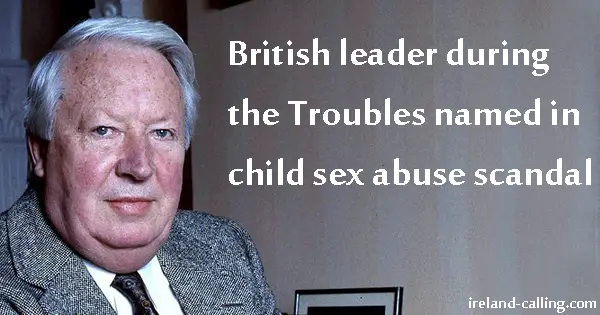The British Prime Minister who dissolved the Stormont government in Northern Ireland and introduced direct rule from London following Bloody Sunday has been named in a child sex abuse inquiry in Britain.
Sir Edward Heath was Prime Minister from 1970 to 1974. British police are now investigating allegations that there may have been a cover-up in the 1990s to prevent him being named as a child sex abuser.

The allegations are thought to have been made by a man who was facing a criminal prosecution. A police officer has come forward to say that the prosecution was dropped to prevent the possibility of the allegation being repeated in court and so made public.
British police have now opened a new inquiry into both the allegations of a cover-up and the allegation that Heath had been involved in child sex abuse. The Guardian newspaper in England reports that police have spoken to the man who faced prosecution in the 1990s and then had the charges dropped. He is now middle-aged and says he was abused by Heath several times as a child.
Police have issued a public appeal for people to come forward if they believe they were abused by Heath.
Superintendent Sean Memory, of Wiltshire police in England, summed up the inquiry saying: “The allegation is that a trial was due to take place in the 1990s and information was received in that trial that Sir Ted Heath was involved in the abuse of children and the allegation is from the result of that information that the trial never took place.
“A retired senior police officer has come forward towards the end of 2014 indicating that they were aware of this information.
“This is an appeal for victims: in particular, if you have been the victim of any crime from Sir Ted Heath or any historical sexual offence, or you are a witness or you have any information about this, then please come forward.”
Heath was in office when the violence in Northern Ireland was at its worst. It was his administration that, with some reservations, allowed the Stormont government in the north to introduce internment, which gave police the power to arrest and detain IRA suspects without trial.
It turned out to be a total disaster and led to an escalation in violence. This led Heath to “think the unthinkable” and open talks with the Irish Taoiseach Jack Lynch about the possibility of there being an “Irish dimension” to any future settlement in the North.
This led to a furious backlash from the Loyalist community who felt that the British were going to abandon them. Heath then faced a backlash from the Nationalist community when British troops opened fire on protesters in Derry, killing 14 of them and injuring many more. The incident went down in history as Bloody Sunday and proved a turning point in Northern Ireland.
Heath decided that the Northern Ireland government at Stormont, with its constant and unassailable Loyalist majority, could no longer govern effectively. He abolished it and introduced direct rule from London.
This pleased neither the Nationalists nor the Loyalists and led to further demonstrations and violence.
Heath’s government then tried to introduce a power sharing administration including representatives of both sides of the community, in line with the Sunningdale Agreement. However, the Loyalist community staged a strike in protest and the initiative failed.
Heath was voted out of office in the British election in 1974. He died in 2005.